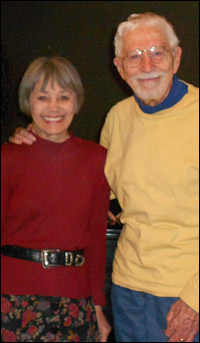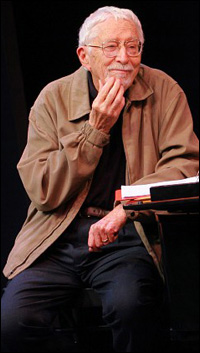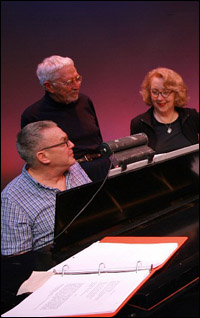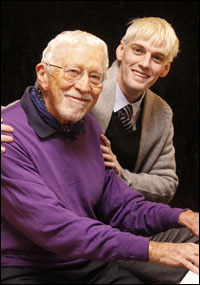
*
Jones wrote the book and lyrics to the phenomenal The Fantasticks, stayed Off-Broadway for 17,162 performances, and has run more than 2,000 more in its current revival. Jones also had Broadway hits with I Do! I Do! and 110 in the Shade, all written with longtime collaborator, composer Harvey Schmidt, who has retired to their native Texas. But the "Try To Remember" lyricist is getting a big New York salute from the Off-Broadway York Theatre Company this spring, presenting the current "Musicals in Mufti: The Tom Jones Festival," new productions of five Jones musicals — some with Schmidt scores; some with music by Others — over the course of two months.
This unprecedented Jonesapalooza features Jones' adaptation of the cult film Harold and Maude (music by Joseph Thalken) April 13-15 with Cass Morgan; his adaptation of Arthur Schnitzler's The Anatol Plays, which Jones titled The Game of Love (music by Jacques Offenbach and Nancy Ford) May 11-13 with Santino Fontana; plus Schmidt's Colette Collage April 27-29 with Christine Andreas; and Roadside March 30-April 1. The series launched with the revue The Show Goes On March 16-18, at which time Jones appeared on stage with Susan Watson, the Girl in original 1959 The Fantasticks one-act version at Hunter College, plus the original Kim in Bye Bye Birdie.
A further note to theatre trivia buffs: Under the name Thomas Bruce, Jones originated the role of the Old Actor in The Fantasticks, and his voice can be heard on the original cast album's "Rape Ballet" declaiming "God for Harry, England and St. Geor-or-orge!" Now 84, the Texas-born Jones last played the role for the show's 50th anniversary in 2010.
How did this tribute come about and what's it like trying to mount five musicals in the space of eight weeks?
Tom Jones: York Theatre Company artistic director Jim Morgan mentioned the idea to me at the end of last summer. He and [actress] Judy Blazer came out to visit me at my country house and we went to the Goshen Fair. We were talking about doing my musical adaptation of Harold and Maude. She's much too young to play Maude but she had played young Colette on the recording of my musical Colette Collage and we wanted to do something with her. As it happened, Judy got another job [Mame at Goodspeed Opera House], as so often happens. Casting is so complicated. And to cast five shows at one time is one of the most insane things I've ever tried to do, especially under these circumstances. Just when you get the one you want, they get a TV show or a Broadway show and you lose them. But we've been lucky so far. We've gotten some wonderful actors for these parts.
| |
 |
|
| Susan Watson and Tom Jones in rehearsal for The Show Goes On. | ||
| photo by Cristin Whitley/York Theatre Company |
TJ: Every one so far has been a challenge. The that was one less of a challenge was Game of Love because it's the last on the schedule. But we've had a wonderful start: Santino Fontana, who played The Boy in the revival of The Fantasticks and appeared in The Importance of Being Earnest, Billy Elliot and Brighton Beach Memoirs, is going to be playing Anatol in this musical, which is based on Arthur Schnitzler's Anatol. The critics have almost universally said this is the most promising young actor in New York. He played Hamlet at the Guthrie Theatre at age 24. In The Game of Love we see him in affairs with five sensational women. The narrator, his friend Max, will be played by Alex Gemignani.
Anatol was musicalized previously in 1961 by Arthur Schwartz Howard Dietz as The Gay Life. Did that affect your version?
TJ: The score of The Gay Life is OK, but the script I don't think is very good. To me, it's not Anatol. But, of course, mine is not Anatol either. Actually I started on this piece before The Gay Life. I began working on it in 1955 and I was still making changes a month ago, so this may be a record for the longest writing period for a musical. In 1960 I had prepared a version that had a narrator but only six songs, all with lyrics by me put to melodies by Jacques Offenbach. I even had an exciting production lined up. Ellis Raab the actor, director and producer was starting a new company with his wife, Rosemary Harris. It was to be called Association of Producing Artists, APA [later merged with the Phoenix Repertory Company] and their first season was scheduled to open in May 1960 and they wanted to do Game of Love, but they wanted me to be there for rewrites during rehearsals. It happens that it was scheduled to open the same week as The Fantasticks, and I chose to be with The Fantasticks.
There are many connections between the two shows. I had originally wanted Ellis Raab to play the Old Actor, and when he wasn't available because of the APA debut, I stepped into the role myself [under the stage name Thomas Bruce].
Later, The Game of Love was done at a regional theatre in Milwaukee and Keith Charles played Anatol. He and his wife, composer Nancy Ford, [I'm Getting My Act Together and Taking It on the Road] met when he was playing El Gallo in The Fantasticks and she was the show's music director. He later appeared in my shows Celebration on Broadway and one version of Philemon at least. Nancy helped me expand The Game of Love with more songs from Offenbach, and then she also wrote four songs for it. Although the story is set in Vienna, the whole tone of the piece is more French than Germanic. That's why I wanted to use Offenbach instead of the Strausses. Offenbach has all the fun things — the gallops and the can-cans. But there's also a rueful, romantic quality to his music. He started off as a cellist, and you can feel that cello background in his work.
One thing I hope we will get with this production is a cast recording. [Earlier York Theatre Company productions of The Show Goes On and the original Roadside got cast recordings.]
| |
 |
|
| Jones in rehearsal for The Show Goes On | ||
| Photo by Ben Strothman |
TJ: Yes, we're taking out the context that's its being presented as part of a traditional touring tent show. We cut a lot of shit-kicking at the top of the show. They love that in Texas but I don't think it helped us here with New York audiences at all. Also we're doing an interesting thing. We have two characters called The Ikes, who are there for comic relief. There are two other characters in the show, Ned the Jailer and the spinster town woman. We're going to have the two Ikes play those roles as well, as two church ladies, and they'll also come in as the Posse. So every time you see them they are playing different roles, which should be fun.
I saw a workshop of your show Colette Collage, based on the life and writings of the French author Colette, in which the actress playing Colette got called to do a commercial at the last minute as wasn't able to do the first act. If I recall, you played Colette for that performance.
TJ: That was so terrifying. There I was, totally unprepared, trying to be Colette in front of an invited audience including Bernadette Peters! But the actress, Cass Morgan, did a lovely job with the second act. She just finished appearing in Memphis and will be taking part in this Musicals in Mufti series. She will be playing Maude in Harold and Maude. , Christine Andreas will be doing Colette this time around.
Harold and Maude is the story of an unlikely romance between a young man obsessed with death, and an 80-year-old concentration camp survivor who teaches him to love life. I saw the 2005 production at Paper Mill Playhouse. Has it changed much since then?
TJ: Oh, it got so lost on the huge stage there. We subsequently did a production at the 500-seat TheatreWorks at Palo Alto, California with five people in the cast and it was hugely successful. I'd say the score and the script have been 50 percent rewritten. We've done lots of good work. We have a wonderful young actor named Matt Dengler playing Harold. He played the Mute and covered The Boy in The Fantasticks. I think he's going to be something, I really do.
The original film Harold and Maude had a distinctive musical personality thanks to the score by Cat Stevens. How did you go about giving the stage musical its own sound and how did you choose which moments to musicalize?
TJ: In the movie the songs were outside commentary. For me, I look, first of all, for where an emotional connection is within myself. I'm old now, older than Maude at this point. And I have comparatively young sons. They were quite young when I started working on this. The connection, reaching across time, is a very personal one. I put it in a song, called "Two Sides of a River, which Maude sings to Harold. He's sort of suspicious of her — but interested.
We're strolling along two sides of a river,
A river known as time.
I'm over here in my final years,
You're over there in your prime. Sometimes we're so close we can almost touch
Sometimes we seem miles apart.
Still, to keep trying can be satisfying
The important thing is to start.
We're strolling along two sides of a river
And until it ends,
Though not eye to eye
At least we can try
To be wonderers and wanderers and friends.
We're treating the story differently for the musical, and we're treating Maude differently. We don't want it to be like Ruth Gordon [Maude in the film]. Because nobody is Ruth Gordon except Ruth Gordon. Something that's touched very lightly in the film we make more of Here — Maude's background as a concentration camp survivor. I don't want to make it sound too grim because that would be misleading. The show is romantic and it is funny. She doesn't go on about her experience. But you realize her need for Harold as much as his need for her. As she says, at one point "You're my tree."
And we've changed the part in the film where she just decides at age 80 she will commit suicide. That's never been acceptable to me. That's the thought of a 24-year old. I'm 84 how, and the best work I've ever done in my life is what I'm doing now. There has to be some compelling reason for such a step. Instead of just deciding that, she now has an illness that will only get worse and she doesn't see any point in going on. So Maude sits Harold down at a party he has arranged for the two of them on her 80th birthday. And she says, "Whatever I tell you, you have to promise not to move." Here she realizes how important this will be to him. She says, "Tonight I'm going to die. I've taken the pills already." He panics and says, "I've got to call somebody!" She says, "You promised. I need you here. To help me make my passage. I don't want anybody else."
He's so distraught, that she says, "Once upon a time I used to think that life was solid like a rock or a tree. Then I lost my husband and my family and the world I knew. I realized life wasn't like a rock, it's like water or the wind. Once I thought life was like this." [Jones clenches his hands in fists against his chest.] "Then I realized life was —" [He spreads out his hands and arms.] "Now I live like this. I open my arms, and whatever it is, I'm ready." She then sings her last song. Which is trying to teach him.
We're like birds who are perched in the limbs of a tree
When the time is right we simply fly away.
Then other birds come and take our places,
But they won't stay.
We come, we go,
It was always so
And so it will always be.
We're like a flock of birds, moving endlessly.
Listen to me
I want you to know
The most important thing:
Before the time we must fly away
We have a chance to sing
Don't miss the chance to sing.
That's very moving. And philosophical.
TJ: Under a lot of my work you often find religious things. In my fitful youth I was very susceptible. I kind of wanted to be a Christian — not a Baptist Christian like where I grew up. It was the philosophy. I got a Kindle for my 84th birthday and I've been reading the Greek philosophers. It's amazing the things they were thinking in 700 BC: "Nothing is, everything is becoming." That's what's wrong with so many religions. They think things are fixed. They want to make things fixed. But things are always in motion.
| |
 |
|
| Michael Rice, Tom Jones and Pamela Hunt in rehearsal for The Show Goes On | ||
| photo by Ben Strothman |
TJ: We lost the rights years ago. We did a special reading for the estate last year with a wonderful company. During the intermission one of the people from the estate came to me and kissed my hand. But they didn't give us the rights again.
Aside from your work on your new musical, The Tempest, what would you most like to accomplish with the rest of your career?
TJ: I'm so eager to see some of these things [the Mufti musicals] staged [fully] again. I did some good work. My dream is to finish things so I don't have to keep being haunted by them. Like The Fantasticks. As far as I'm concerned it is finally rewritten. I don't have to change it any more. Finally! I thought I did the final rewrite for the 2006 revival. But then I changed a line at the end for the 50th anniversary, and it made me so happy.
Is it the "wall" line?
TJ: Yes.
After the lovers are reunited at the end, the fathers want to tear down the wall they built between their properties. But El Gallo warns them, "Keep the wall. Remember, you must always keep the wall." What did you change?
TJ: Now he says, "No. Forget about the wall. It's not about the wall." Which it isn't. I realized that the old line sounds profound, but it's bullshit. The show is not about that at all. In any way. But Lore [Noto, the original Off-Broadway producer] wouldn't let me take it out. He didn't want me to change the "Rape" song ["It Depends on What You Pay"] either, but I eventually did. [Replaced by a song called "Abductions."] It gets just as many laughs, and it doesn't haunt me. The other one [based on a speech in the Edmund Rostand original] really, really, really made me feel bad for a long time.
| |
 |
|
| Jones and Aaron Carter earlier this season, when Carter starred in The Fantasticks. | ||
| Photo by Joseph Marzullo/WENN |
TJ: Tell them to shove it. It's not funny. "'Tain't funny, McGee," as they used to say when I was young. You can say it's not really about rape, of course, which we did for a long time. But then why are you going on about rape? You're getting laughs from the shock value. And rape isn't funny any way you slice it.
Do you ever stop by the Off-Broadway revival of The Fantasticks?
TJ: I haven't for while. The show has stayed in pretty good shape.
The last time you played the Old Actor was for the 50th anniversary in 2010. Was that the capstone of your acting career?
TJ: I [was] in The Show Goes On [at Musicals in Mufti] but I don't think I'm going to do much acting anymore.
You're now older than the Old Actor. Do you think you'll ever play him again?
TJ: As Colette says to her young lover, "Never say never. It's a young man's word."
(Robert Viagas is executive editor of PlaybillEDU.com, founder of the news service of Playbill.com and author or editor of 16 books including "The Amazing Story of The Fantasticks.")









